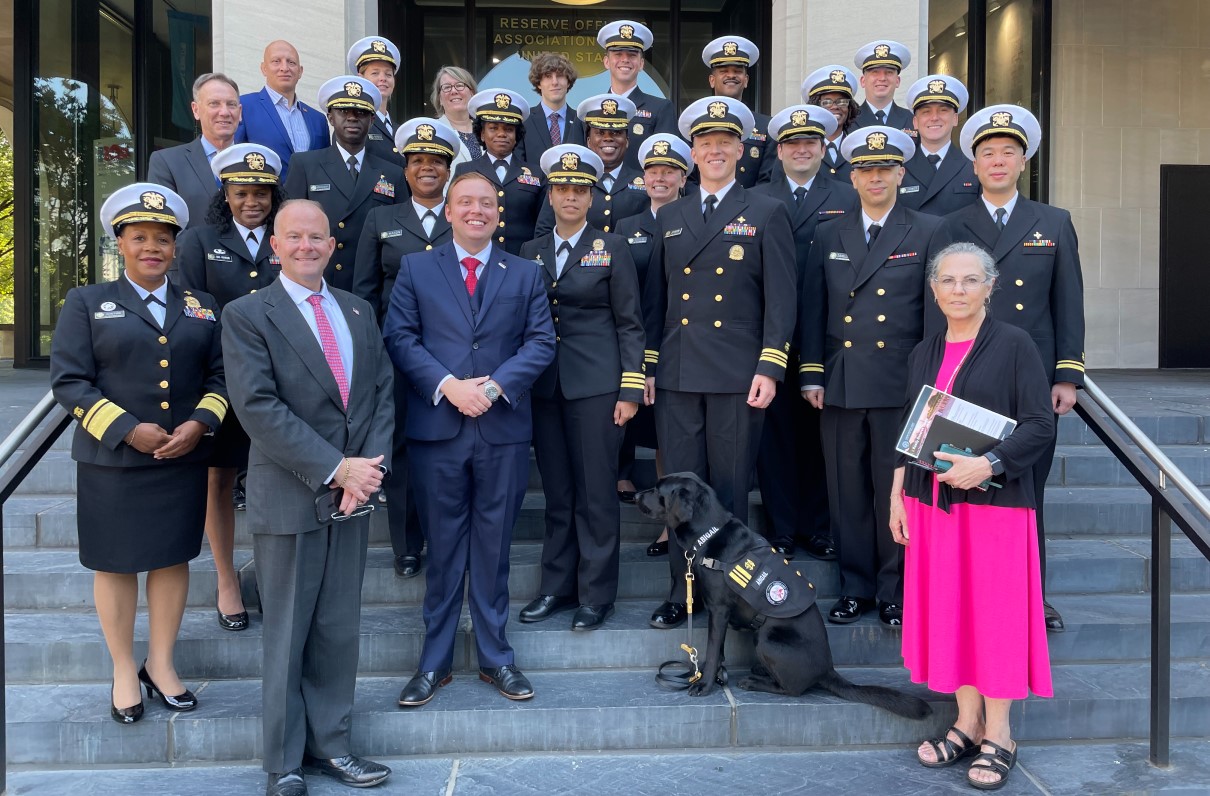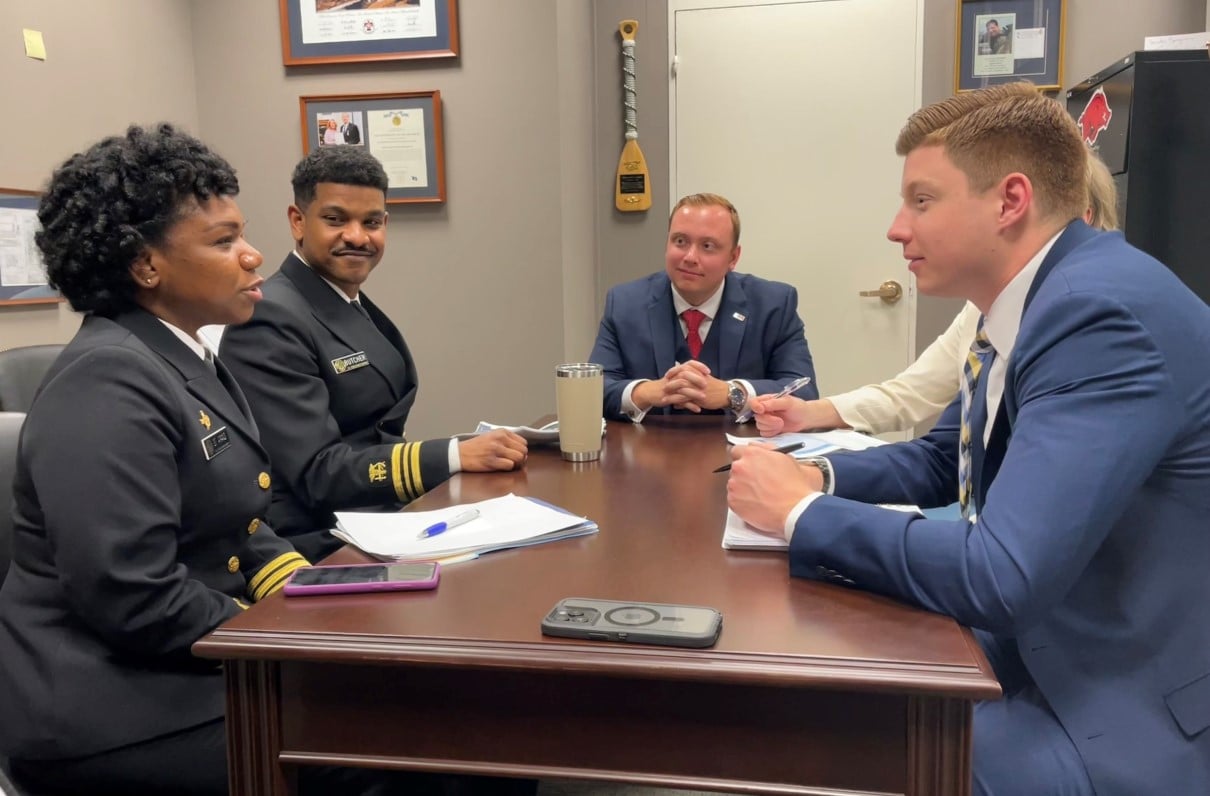The U.S. Public Health Service Commissioned Corps has a small Ready Reserve force trained in medicine, public health, and emergency response.
The desire to serve is there. The talent is there. But the money is not.
These 95 members of the USPHS Ready Reserve are inactive, unable to conduct drills, and facing an uncertain future.
In uniform, they have provided medical support for the Coast Guard, filled vital health care roles on Indian reservations, and assisted Afghan refugees who fled their country as the Taliban took control.
And today, as the military health system threatens to buckle in the face of staffing shortages, higher costs, and growing needs, these men and women could provide a personnel pipeline … and much-needed support.

U.S. Public Health Service Commissioned Corps officers, including reservists, pose with advocates prior to a “Hill Day” in Washington, D.C., run by the Reserve Organization of America with support from MOAA. (Photo by Tony Lombardo/MOAA)
MOAA joined the Reserve Organization of America (ROA) and other advocacy groups June 13 on Capitol Hill to advocate for the Parity for Public Health Service Ready Reserve Act (S. 2297). This measure would fund the USPHS reserve component and provide its members with the same benefits received by all other reserve component troops.
“This situation is really black and white,” said Karen Ruedisueli, MOAA’s director of Government Relations for Health Affairs. “The reserve components of other services have personnel policies and compensation they need to help them recruit and retain the people they need. In the USPHS Ready Reserve, those are obviously missing.”
The USPHS Ready Reserve stood up with the March 2020 passage of the Coronavirus Aid, Relief, and Economic Security (CARES) Act. During the pandemic, USPHS officers deployed often in support of COVID response, earning greater national awareness and support in the process.
[FROM 2021: ‘Stepping Into Chaos’: USPHS Officers on the COVID-19 Fight]
The service had the green light to grow a cadre of 400 reservists, though it never reached that figure. With no funding mechanism, recruitment is on pause and service leaders want to keep the Ready Reserve members they have, even as they aren’t earning drill pay or credit toward retirement.
The USPHS Commissioned Corps, including reservists, is about 5,500 strong. Its ranks include doctors, dentists, nurses, pharmacists, clinical and rehabilitation therapists, dieticians, engineers, environmental health officers, scientists, veterinarians, and more. They serve at home, along our borders, and overseas, often alongside DoD personnel.
About 20 USPHS officers joined the advocates at the June 13 Hill event, led by ROA. These officers – a mix of active duty members and reservists – shared their own stories of service.
“The PHS, as one of the eight uniformed services and the only service with an exclusive focus on public health, is at the forefront of protecting our nation’s health,” said Sens. Tammy Duckworth (D-Ill.), Ron Wyden (D-Ore.), and Mazie Hirono (D-Hawaii) in a MOAA-endorsed May letter to leaders on the Senate Appropriations Subcommittee on Labor, Health and Human Services, Education, and Related Agencies. “Its dedicated personnel, serving in 800 locations across the country and overseas, are the unsung heroes tirelessly working to ensure that Americans receive necessary medical and public health support in their daily lives and during times of crises particularly in underserved and vulnerable populations.”
The senators are asking for at least $32 million, a small amount in U.S. budget dollars, but a vital amount to sustain this reserve.
Their measure would also grant these servicemembers eligibility for benefits like TRICARE Reserve Select, TRICARE Dental, and the Post-9/11 GI Bill. These are benefits that all other branches’ Guard and Reserve cadres receive (The NOAA Commissioned Corps does not have a reserve component).
“The Public Health Service Commissioned Corps is essential in protecting the well-being of Americans,” Wyden said in the press release announcing the introduction of the Parity for Public Health Service Ready Reserve Act. “These are dedicated service members who are on the front lines of public health emergencies, risking their lives and selflessly serving our nation. Making sure they receive the same support and benefits as other uniformed service members is the right thing to do and will only further strengthen the health of our nation.”
When MOAA Speaks, Congress Listens
Learn more about MOAA’s key advocacy issues, and contact your elected officials using our messaging platform.

